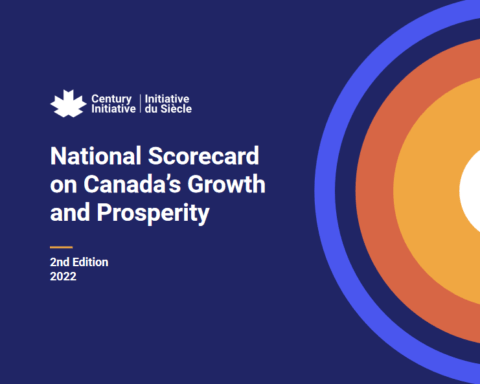
New Democratic Party leader Tom Mulcair, along with Toronto City Councillor Joe Cressy, seen here engaging with residents in Chinatown.
Photo Credit: Joe Cressy via Flickr CC
Can political parties court an “ethnic vote”?
Sometimes it seems like politicians assume the support of ethnic minority communities is there for the taking, as long as parties put in the effort to reach out to them with symbolic gestures or concrete policies. Two recent examples of the Conservative government’s efforts to appeal to voters in ethnic minority communities illustrate this.
One is the memorial to the victims of communism, which the federal government plans to build this summer. As Jeffrey Simpson notes in the Globe and Mail, the memorial is intended to appeal to Eastern European immigrants and their descendants: “The Conservatives have worked very hard to attract these voters by other means, and the memorial represents a further tangible demonstration of the party’s efforts.”
[I]t’s important to keep in mind there is no single “ethnic vote.”
Another is the $6 million over five years, earmarked in the recently tabled federal budget to improve services for Canadians who want to send money to individuals (typically family members) in their countries of origin. Immigrant communities appear to be the target of this measure.
How successfully will these efforts garner voter support in ethnic minority communities?
The Myth of the Monolithic “Ethnic Vote”
To begin with, it’s important to keep in mind there is no single “ethnic vote.”
Canada contains a large number of different ethnic minority communities. According to the 2011 National Household Survey, while the majority of Canadian residents report British Isles or French ethnic origins, seven other ethnic groups each have populations of more than one million: German, Italian, Chinese, East Indian, Ukrainian, Dutch and Polish.There are many other smaller, but nonetheless sizeable, groups, too.
[T]he very idea of an “ethnic vote” supposes that members of ethnic minority communities vote on the basis of their ethnic identities.
No single strategy can win the votes of all of these different communities’ members. Parties may succeed in appealing to some communities, but not others.
More significantly, the very idea of an “ethnic vote” supposes that members of ethnic minority communities vote on the basis of their ethnic identities.
There’s no question that ethnic identity often features prominently in people’s lives, but voters might not have that in mind when casting their ballots.
While many people identify as members of ethnic groups, they also have national and provincial identities, religious identities, occupational identities, and so on. When it comes to deciding on whom to vote for, these other identities could be far more important than ethnic identity.
Minority community members also have distinct political views, unrelated to their ethnic identities, to which parties can appeal.
Many members of ethnic minority communities are first- or second- generation Canadians. Perhaps they see political issues somewhat differently than other Canadians because of their (or their parents’) unique experiences, both in their countries of origin and in Canada.
Not So Different From the Rest of the Canadian Electorate
The question is, do those differences really matter?
Voters support or reject parties and candidates for all sorts of reasons. For example, a difference in views about social issues means little if voters are focused on the economy, taxes or health care.
There’s no evidence that ethnic outreach actually works – but the parties believe it might, and this conviction shapes both electoral strategies and policy making.
Parties and leaders have some power to shape the election agenda, but not total power. The Parti Québécois learned this lesson the hard way in the 2014 Quebec election, when its efforts to mobilize voters in defense of secularism were overshadowed by one of its star candidate’s unscripted, and ultimately damaging, statements on sovereignty.
New Canadians are no less savvy than the rest of the Canadian electorate. While it’s true that recent immigrants don’t have many years of experience with Canadian politics and elections, research also suggests they learn rather quickly.
There’s no reason, then, to think that parties’ targeted appeals to ethnic minority communities are any more effective than the strategies used to win the support of other kinds of voters.
Where does this leave us? We can be sure the “ethnic vote” will figure prominently in political parties’ 2015-election campaigning. While the success of their efforts can in no way be assumed, the parties will undoubtedly compete for the support of new Canadians.
There’s no evidence that ethnic outreach actually works – but the parties believe it might, and this conviction shapes both electoral strategies and policy making.
Canadian political parties’ ongoing and ever more systematic efforts to compete for the votes of new Canadians helps explain why anti-immigrant discourse is so rare in Canadian elections and why Canadian parties, regardless of their ideological stripe, support robust immigration levels and the maintenance of an official multiculturalism policy.
Put differently, Canadian “exceptionalism” in the area of immigration politics and policy may have less to do with our innate civic virtues than with the strategic calculations of our political operators.
Stephen E. White is a SSHRC Postdoctoral Fellow at Concordia University’s department of political science.
Inder S. Marwah is a SSHRC Postdoctoral Fellow at McMaster University’s department of political science.
Phil Triadafilopoulos is associate professor of political science at the University of Toronto Scarborough and the School of Public Policy and Governance.




